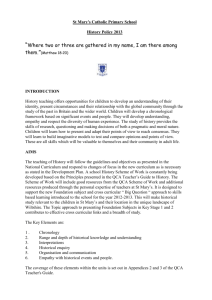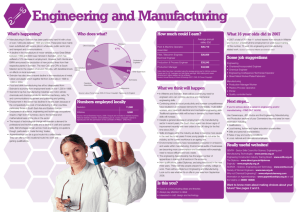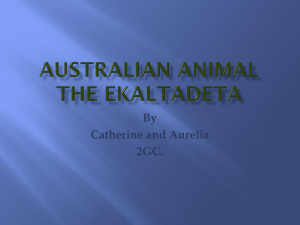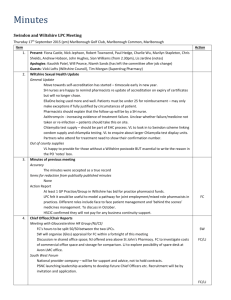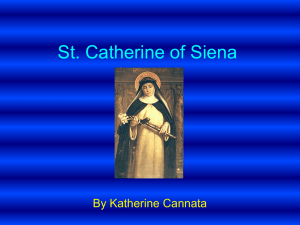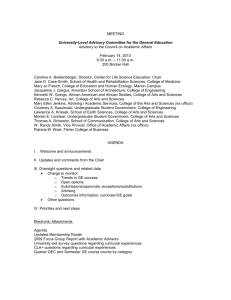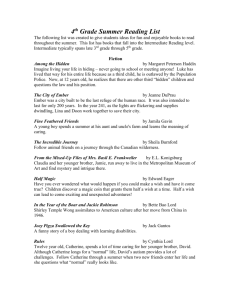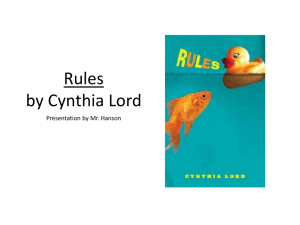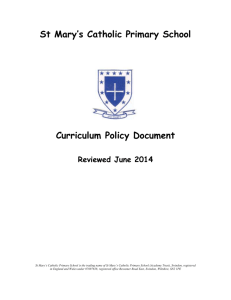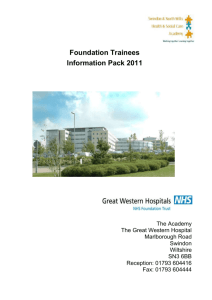History Policy
advertisement
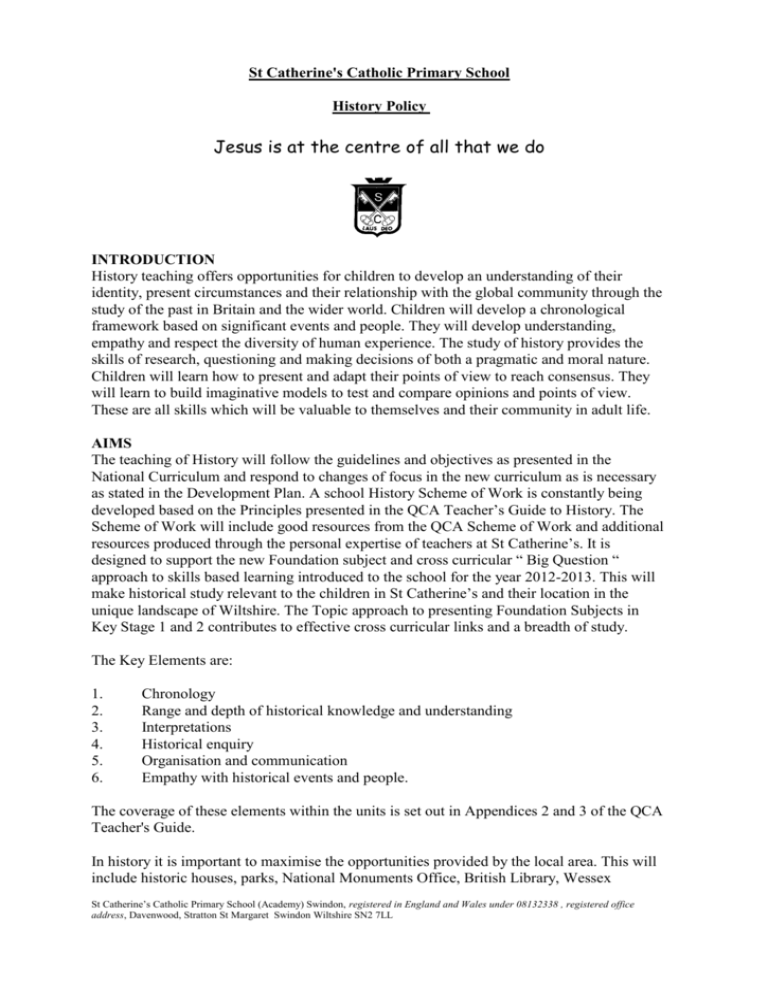
St Catherine's Catholic Primary School History Policy Jesus is at the centre of all that we do INTRODUCTION History teaching offers opportunities for children to develop an understanding of their identity, present circumstances and their relationship with the global community through the study of the past in Britain and the wider world. Children will develop a chronological framework based on significant events and people. They will develop understanding, empathy and respect the diversity of human experience. The study of history provides the skills of research, questioning and making decisions of both a pragmatic and moral nature. Children will learn how to present and adapt their points of view to reach consensus. They will learn to build imaginative models to test and compare opinions and points of view. These are all skills which will be valuable to themselves and their community in adult life. AIMS The teaching of History will follow the guidelines and objectives as presented in the National Curriculum and respond to changes of focus in the new curriculum as is necessary as stated in the Development Plan. A school History Scheme of Work is constantly being developed based on the Principles presented in the QCA Teacher’s Guide to History. The Scheme of Work will include good resources from the QCA Scheme of Work and additional resources produced through the personal expertise of teachers at St Catherine’s. It is designed to support the new Foundation subject and cross curricular “ Big Question “ approach to skills based learning introduced to the school for the year 2012-2013. This will make historical study relevant to the children in St Catherine’s and their location in the unique landscape of Wiltshire. The Topic approach to presenting Foundation Subjects in Key Stage 1 and 2 contributes to effective cross curricular links and a breadth of study. The Key Elements are: 1. 2. 3. 4. 5. 6. Chronology Range and depth of historical knowledge and understanding Interpretations Historical enquiry Organisation and communication Empathy with historical events and people. The coverage of these elements within the units is set out in Appendices 2 and 3 of the QCA Teacher's Guide. In history it is important to maximise the opportunities provided by the local area. This will include historic houses, parks, National Monuments Office, British Library, Wessex St Catherine’s Catholic Primary School (Academy) Swindon, registered in England and Wales under 08132338 , registered office address, Davenwood, Stratton St Margaret Swindon Wiltshire SN2 7LL Archaeology, museums, galleries, Prehistoric, Roman, Medieval, Georgian, Victorian and modern landscapes. The history co-ordinator receives regular newsletters about events at local historic sites (eg. Lydiard House, the Railway Museum, etc.) and is creating a collection of artefacts and hands on materials linked to various historical topics including coin and pottery shard collections. ORGANISATION In KS 1, history is about the lives of famous people in the recent past and about famous and ordinary people and events in the more distant past, including those from British history. In KS2 history is about people and important events and developments from recent and more distant times in the locality, in Britain and in other parts of the world. The scheme of work will be based on the QCA Guidelines, which includes some topics from the QCA Scheme of Work and some topics designed by teachers based on their personal expertise. In line with the report "Maintaining Breadth and Balance" and the new Topic approach to presenting Foundation Subjects, references will be made in each Term’s Topic plan on how children are to achieve the key elements of historical study. In anticipation of the new National Curriculum and in response to the recommendations of the Primary Review, the scheme of work will highlight the use of cross curricular skills of Numeracy, Literacy and ICT as part of the skill used in investigating and presenting historical evidence and conclusions. This cross curricular use of skills in history based activities already goes on at St Catherine’s. The new St Catherine’s History Scheme of Work, in conjunction with St Mary’s, will offer possible teaching activities and resources, but teachers may wish to teach the unit in other ways, which will achieve the learning outcomes. These experiences and the resources created will then be added to the Scheme of Work on a Term by Term basis. Teachers are also likely to use additional ways of encouraging children to find out about events and people from the past. These will include reading fiction and non-fiction accounts of the past. Whatever children’s path through the school, each pupil will have a balance of the key elements and will have experience of a range of historical periods. HOW HISTORY IS TAUGHT History in the Foundation Stage is taught through the Early Learning Goals within the Area of Learning "Understanding the world" and as part of the new” Big Question “ approach to studying Foundation subjects in a skills based, cross curricular way. The children will be encouraged to: Find out about past and present events in their own life and in those of family members and other people that they know and learn to understand and respect their own culture and the culture of other people. At both Key Stage 1 and 2, History skills will be taught as part of the new ” Big Question “ approach to studying Foundation subjects in a skills based, cross curricular way and an ongoing process where teaching strategies will be selected to suit the purpose of the learning situation. History is primarily taught through a whole class approach with partner work or differentiated small group tasks where appropriate. The focus for the future is to develop and encourage children’s practical historical investigation skills by providing a library of St Catherine’s Catholic Primary School (Academy) Swindon, registered in England and Wales under 08132338 , registered office address, Davenwood, Stratton St Margaret Swindon Wiltshire SN2 7LL artefacts which can be used to support learning and develop some archaeological skills in investigating and interpreting data. Children will be encouraged to develop a historical imagination and learn to build models to test theories and interpretations of data, reaching a consensus and conclusion with their piers. RESOURCES A bank of historical resources has been developed in addition to the existing resources and will be added to as required to support the History Scheme of Work as it constantly evolves. These resources include reference books, handouts, artefacts, ICT resources, documents and contact details of local experts, museums and details for possible school visits linked with particular Topics. ASSESSMENT AND RECORDING Assessment opportunities will be built into planning, notes may be used to inform future planning. Each child will undertake a focused assessment task, which will be carried out at the end of each Topic where History is a key focus. Each child has a topic book to record work. In addition, there are class topic books. The new assessment sheets will be used to show the class’s achievements and 3 children from each class will be focused on in detail. EQUAL OPPORTUNITIES Every child will be encouraged to and will have the opportunity to participate fully in the activities planned both within and outside the classroom. MONITORING The Subject Leader will monitor History within the school and will provide a written report twice a year based on planning and samples of work. The History co-ordinator will support staff where required. A History Portfolio is now set up to contain evidence of planning, examples of good work and subject manager reports. St Catherine’s Catholic Primary School (Academy) Swindon, registered in England and Wales under 08132338 , registered office address, Davenwood, Stratton St Margaret Swindon Wiltshire SN2 7LL
